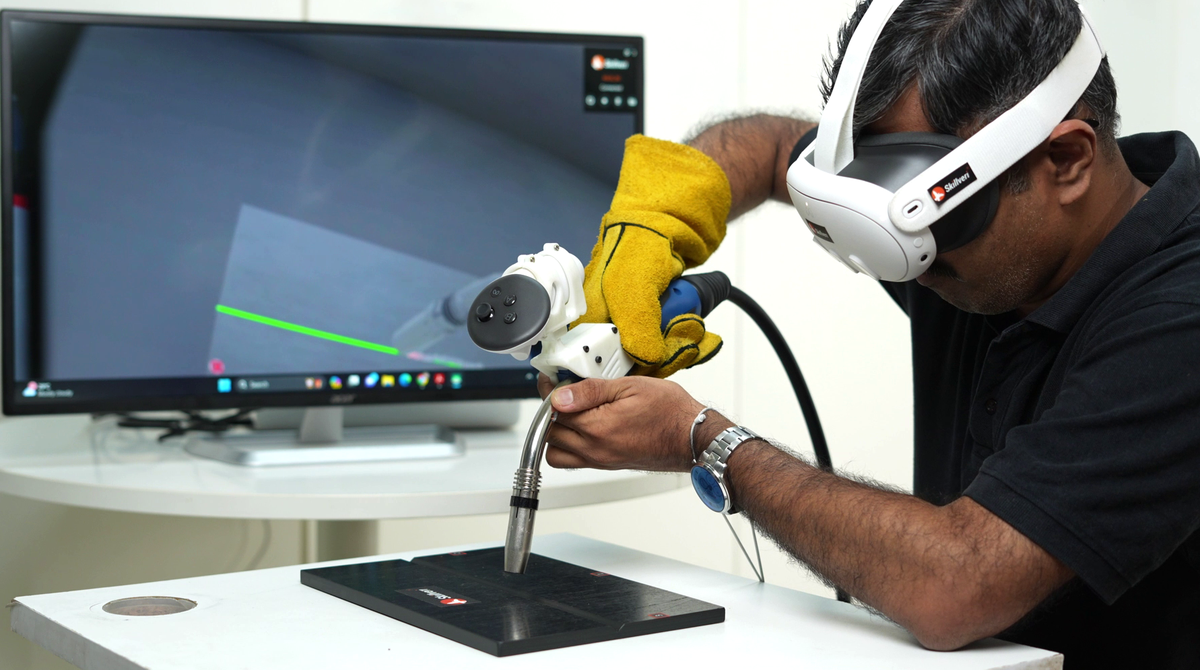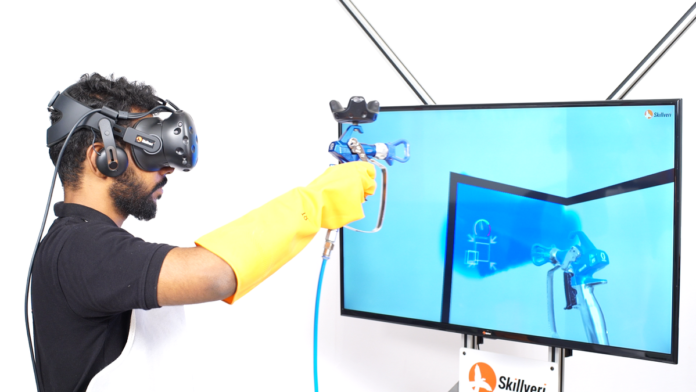
Using Skillveri’s proprietary software, workers can be taught welding, spray painting, and HVAC and solar panel installation
| Photo Credit: Special Arrangement
Can you play basketball on the Moon? That’s the feat Skillveri pulled off to showcase at the G20 Summit in 2023. The start-up’s idea was to make children practically understand how gravity worked in different environments. They simulated the force in three different places—Earth, Moon and Mars—by building a game of basketball in virtual reality.
We played the game in Skillveri’s office in Chennai. Once the headset was turned on and the game booted up, we were surrounded by a slightly pixelated view of what looked like the surface of the Moon—surrounded by powder white mountains and a black sky sprinkled with stars.
Using the accompanying handset, we picked a digital ball from a virtual tray and flung it towards the hoop without considering the moon’s reduced gravity. The ball went past the hoop, disappearing into the black void of the universe beyond. We picked a new ball and tried shooting another hoop. This time, it was on Mars, where dusty winds rushed past us. And once again, we missed to score. The gravity acting against the ball was distinctly different in both the environments.
While Celestial Basketball is a game Skillveri designed largely for fun, the company’s core area of focus is building and deploying simulations meant to reduce the learning time and cut the training costs of painters and welders employed by large enterprises.
(For top technology news of the day, subscribe to our tech newsletter Today’s Cache)
Established in 2012, Skillveri started with building its own headsets in an effort to upskill workers. However, as Meta released multiple iterations of its Quest headset and then slashed the device’s price, Skillveri decided to leverage Meta’s advanced hardware and focus on building the mixed and virtual reality training programmes instead.
Using the company’s proprietary software, workers can be taught welding, spray painting, and HVAC and solar panel installation. There are multiple levels and tests for each skill, so the user can learn from the basic modules and move on to more complex tasks.
While the start-up is based in India, it has operations in the U.S. and Europe. Combined, it has over 400 installations, and has trained 2.5 million people with its tools since its inception about a decade ago. Some customers include Indian Railways, JCB, Berger, Ashok Leyland, Hyundai, Tata Motors, and Asian Paints.

A person is shown practicing welding techniques with the help of Skillveri’s system and Meta’s headset
| Photo Credit:
Special Arrangement
Founded by Kannan Lakshminarayan and Sabarinath Nair, the company aims to equip people with skills to make them employable in the organised sector, where worker protections and salaries are greater
Mr. Nair noticed earlier that despite having a large workforce, Indian firms still needed to source foreign expertise and labour for large scale construction projects. And prospective learners were being put off by the cost of professional welding courses and the time required to complete them.
“We are taking [a] two-month portion of a one-year course and then making it into half, so that with this intervention, you can get a job in a[n] automotive industry. And once you learn this and get some experience, you come back and upskill yourself,” he said. “With multiple interventions, you can get a job in a power plant where more complex building happens.”
The Indian market versus the overseas market
The founders observed that graduates in many premier Indian institutions were qualified in engineering, but they did not want to actually pick up equipment to tinker around with the machinery.
“I think the challenge is that white collar [workers] should come with empathy for the blue collar [workers] and that will come only when you are doing it,” Mr. Nair said. “In India, we have this trend that you finish your graduation and then straight away without experience go for an MBA and then with a fancy salary come and manage people without having any clue how the work gets done.”
Whereas in the U.S., he pointed out, people had to build experience by participating in practical roles.
Unlike in India, Skillveri did not have to spend time convincing U.S.-based employers that professional training was needed or that simulations were useful; they could move directly to promoting their own product, Mr. Nair explained.
While a growing number of tech ventures both within India and abroad are enhancing their workflows with generative artificial intelligence (AI) technologies or models, Skillveri said that its products were based on physics and mathematical formulae that did not currently require AI.
However, the company is still experimenting with the technology to see if it will be useful to its customers.
“We are currently running a limited beta trial of predictive AI that is useful to our customers in predicting the possibility of errors on newer product lines, without actually running a trial production run. This saves crores of rupees and many months of effort in validating newer product lines in manufacturing,” Skillveri said.
In the interim, Skillveri is looking to gamify its professional offerings by using the Unity 3D game engine to build its projects.
#Chennaibased #firm #virtual #reality #train #industrial #workers
